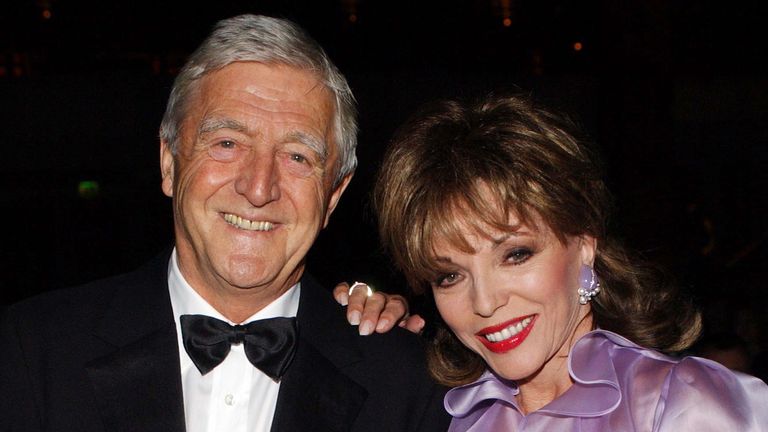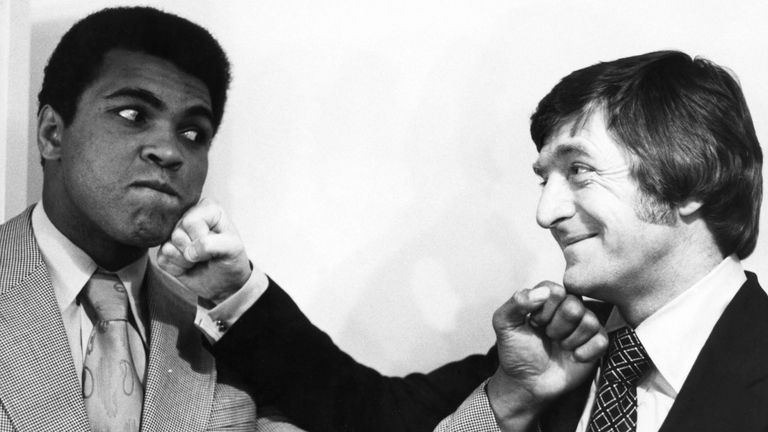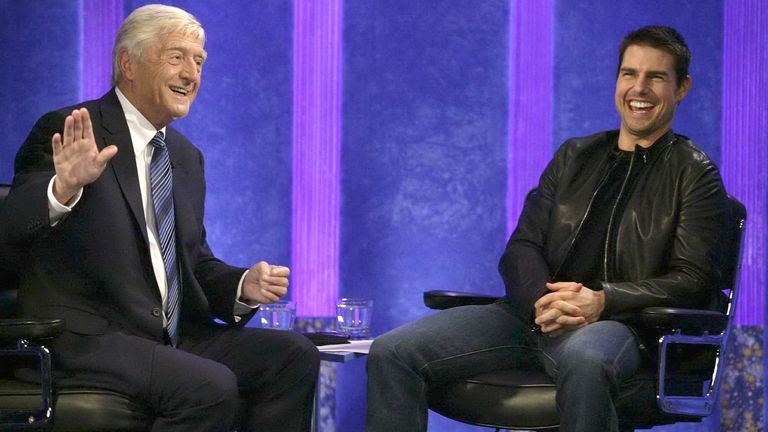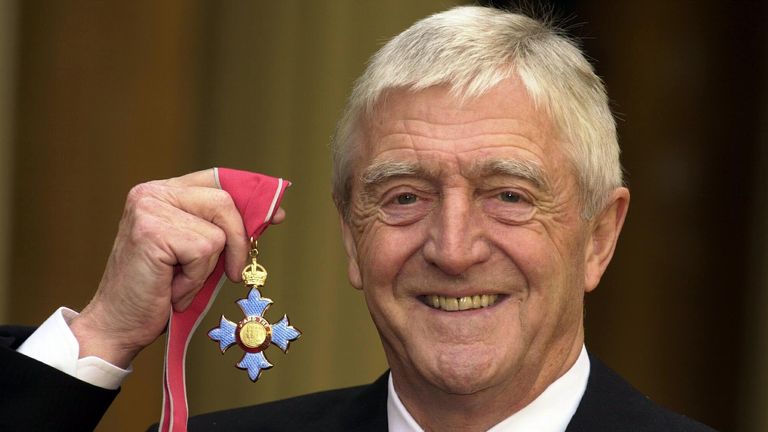Sir Michael Parkinson’s son says the chat show king – who interviewed stars including John Lennon, Muhammad Ali and Madonna – would never have achieved such onscreen success without the love and support of his wife, Mary.
Mike Parkinson told Sky News: “She inspired him. She gave him confidence. She was his mentor.
“But also, she was his morality. She was his moral core.
“She told him when he was making the wrong decisions. She told him and he made the right decisions.”
Please use Chrome browser for a more accessible video player

1:50
A look back at some of Parkinson’s most memorable interviews
Known for his interviews with the world’s biggest celebrities, Parkinson died last week aged 88, following a brief illness.
A journalist and presenter in her own right, Mary Parkinson presented the 1970s magazine programme Good Afternoon and went on to appear regularly as a panellist on Through The Keyhole.
Now 87, she married Parkinson in 1959 and they went on to have three sons together.
More on Michael Parkinson
Speaking to Wilfred Frost on Sky News Today, Mike Parkinson joked: “She nearly had to divorce him when he refused to go and have dinner with Clint Eastwood.
“He turned down the opportunity and my mother didn’t speak to him for about two weeks.”
Following Parkinson’s death, tributes poured in from around the world from fans and high-profile figures, many of whom had been interviewed by the chat show host.
Mike explained the “strange experience” of losing your father when he’s a well-known public figure, saying: “We knew him as a father and a husband of 64 years.
“And as much as we adored what people said about him and felt immensely proud about it, it does have a strange effect upon you as a private person because it pushes your grief to the side.
“You don’t almost feel as if you can properly grieve because you want to allow the public, that knew him in a different way, to grieve [first].”

Parkinson and Joan Collins in 2001
He said his father would have been “shocked” by all the tributes, adding, “he had absolutely no sense of the legacy that people talk about or the iconic status”.
Detailing the challenges of growing up with a famous dad, he said: “It’s a weird experience… You have this man at home, but he’s also public property and you have to share him with the world.”
He said while the family would enjoy Sunday lunches together, his father’s work would often encroach.
“We were also acutely aware that when he was doing a show, it was very much the house was quite tense,” he said.
“He was very nervous beforehand. And we had to sort of take a backseat and let him get on with what he wanted to do. He was quite traditional that way.”

Parkinson and Muhammad Ali in 1974. Pic: BBC
With perks like getting to meet Kermit The Frog, Mike said growing up in a time before mobile phones and social media helped keep his childhood “normal”.
He explained: “Because the cult of celebrity hadn’t existed then, I wasn’t really aware, my friends weren’t interested in what my dad did for a living, their parents kind of were a bit more interested, but no one really noticed it because there wasn’t a mobile phone, there wasn’t the Internet.
“So, therefore I had a very normal childhood, but I had this weird existence where I could go and meet these extraordinary people.”

Parkinson and Tom Cruise. Pic: ITV/Shutterstock
Looking back at his father’s humble beginnings growing up in a council house in Cudworth, near Barnsley, he says despite his success, Parkinson “had no confidence in himself”.
With a working-class background, he said Parkinson “constantly felt that he was going to get a tap on the shoulder to say, ‘You don’t belong here,’ because he was amongst people who he thought were his superiors…
“He always felt, to a certain extent, that he had to prove himself, and that made him very insecure. That made him drive himself forward all the time and question himself.”

Parkinson receiving his CBE at Buckingham Palace in 2000
Frequently critical of the decline of TV and the celebrity in his latter years, Mike says Parkinson was foremost a journalist and not a TV star: “He was never interested in fame for fame’s sake… He approached every single person, no matter how famous, with a journalistic eye.
“He wasn’t a comedian. He didn’t have a patter. He didn’t have any kind of sketch to throw to.
“In the end, he was a facilitator, he interviewed, but you had to be able to deliver. And that’s what he was about.”
Unable to write in his final years, Mike says it was that loss that caused his father the most sadness, concluding: “In the end, if you ask him now up there when he went to the pearly gates and they asked him what he did for a living, he would have said journalist because that’s what gave him the most pleasure.”







